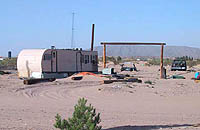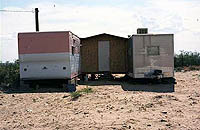| Women's Studies Professor Examines |
|||||||
|
|||||||
| Feminist geographer charts the
progress in three colonias along the Mexican/U.S. border.
By Valerie Orleans In isolated neighborhoods along the Mexican/U.S. border, poor families gather in small groups or colonias. The groups’ needs are great since there is no infrastructure wastewater treatment systems, roads and natural gas lines may be non-existent. Since most colonias are outside city limits in undeveloped areas, neighboring cities are not required to provide assistance and lack jurisdiction. It is this lack of basic necessities that propel women of the colonias into activist roles... and that activism has prompted Rebecca Dolhinow, assistant professor of women’s studies, to chart the progress of such efforts in three colonias. As a feminist geographer, Dolhinow has always been interested in womens activism. It was while working on her doctoral thesis at Berkeley that she became interested in the rise of women leaders in the colonias. While her work centers on such communities in New Mexico, much of what is happening there occurs in other states as well. A common misperception, Dolhinow said, is that those residing in colonias are undocumented immigrants. In fact, most have green cards and many are American citizens. What happens is that they are poor, and so unscrupulous people often take advantage of them, said Dolhinow. They pay for the land, after being told that roads and sanitation systems will be developed. Then the developer skips town and nothing has been done. When this happens it leaves families living in isolated, unsanitary conditions. And it is these conditions that lead women into the role of activists and community organizers. Activism takes a lot of work, especially if you're poor or don't have access to the people you need to see, she explained. But conditions become so appalling that the women are forced into action. For instance, because there is no wastewater treatment, you see children suffering from cholera something we usually associate with third world countries. One of the mothers said to me, ‘But this is America people don't live like this here.’ Why do women become more involved rather than the men? Often it's because women are more affected by the lack of basic necessities. Men are off working all day and perhaps they don't have the daily challenges of trying to bathe children or cook without potable water, said Dolhinow. And, quite simply, activism takes a lot of work. Many of these men have been out in the fields all day. When they return home, they're simply exhausted. One thing the women organizers did mention was that they were only able to take on their activist roles because they had support from their spouses or partners. So men do contribute, but it's more of a background role. There also is a tradition of female leadership in Mexico both formally and informally. In the New Mexico colonias that Dolhinow studied, a priority was attaining access to natural gas. The families often live in substandard housing with wide gaps near doors and windows, she said. During the winter, it becomes very cold. Most use propane to heat their homes, which is expensive and dangerous. Many of these women pair up with outside agencies to apply for grants. In turn, they work with the agencies by providing introductions or serving as promotores to help their communities gain access to better health services, educational opportunities and more. It's fascinating to watch these women become more empowered through their work, said Dolhinow. |
|


